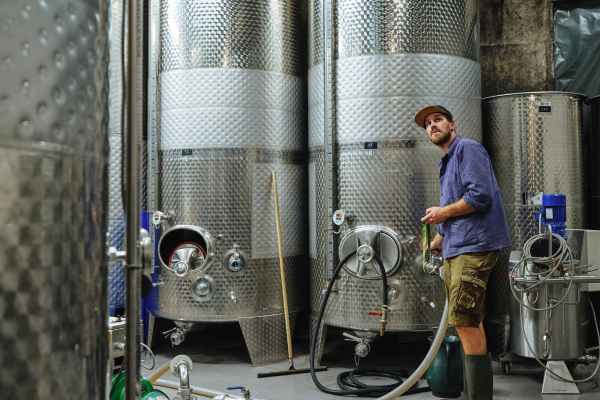
Wine production in Australia spans over 100,000 hectares of vineyards, with South Australia leading in production. However, Tasmania has made significant strides in recent years, achieving record crushes in 2024 (Wine Australia, 2024). This extensive national production results in approximately 1.4 million tonnes of winegrapes crushed annually, generating various types of waste, including winery marc and wastewater.
Waste production varies between winery production sites, depending on production volumes and complexity. Grape marc (skins and seeds) produced from the winemaking process can be composted with other organic feedstocks and reused in the vineyard, or reprocessed for additional grape extracts such as tannins and colour.
Relatively high amounts of water can be used during the winemaking process for cleaning, including washing down floors, equipment, tanks, barrels and transfer lines, as well as bottling line cleaning and sanitation. Additionally, stormwater is sometimes directed into wastewater treatment systems, which can significantly increase the volume of wastewater which needs to be managed.
The quality of wastewater is also highly variable between wineries, seasons and within seasons, which can change the management approach. The parameters that are most important when considering the reuse of the wastewater include; the organic load, suspended solids, pH, salinity, sodicity and nutrient levels (e.g. potassium).
To improve the quality of wastewater and ensure that it can be reused for irrigation, treatment of some form is required. This may include screening to reduce the solids content, anerobic and/or aerobic treatment to reduce organic load and, possibly, reverse osmosis to reduce salinity.
Between the treatment process and reuse, it may be necessary to store raw and/or treated wastewater on site for a period. The storage must be large enough to store the volumes produced over the non-irrigation (winter) period, as well as account for the peak production times during vintage.
Reuse of wastewater for irrigation can provide benefits to on-farm operations, manage environmental risk and reduce disposal costs. Reuse must be appropriately managed to mitigate risks that are associated with the application of treated wastewater. This should include appropriate irrigation system design and nutrient and salt budgeting using wastewater and soil quality data.
Pinion Advisory has a team of viticulture, water and waste specialists who can help to design and monitor waste management and irrigation systems for wineries and vineyards. Our services aim to improve environmental performance, meet compliance targets and convert waste products into valuable agricultural assets (nutrients, water and carbon).
1300 746 866
hello@pinionadvisory.com